×


We have detected your country as:
Please click here to go to the USA website or select another country from the dropdown list.
by: Rev. Rebecca J. Brimmer, International President and CEO

Photo credit: Antonio Gravantee/shutterstock.com
Daniel is an amazing biblical example of a man totally surrendered and committed to God; a man that God used then and has used through the ages until the present time. His prophecies are still considered relevant today as they relate to latter times. Jewish and Christian scholars study Daniel with great interest. In the Art Scroll commentary on Daniel, Rabbi Nosson Scherman describes Daniel as a bridge to eternity! In the Writings of the Apostles (N.T.) both Matthew and Mark refer to one of his prophecies. The prophet Ezekiel cites Daniel three times. He recognizes Daniel as a righteous man.
Certainly many things could be written regarding the amazing prophetic material in the book of Daniel. However, in this teaching letter, I want to look at other aspects of Daniel. He was a fascinating man of integrity, prayer, a man of great wisdom and acuity. He was promoted to positions of authority in Babylon—a land of captivity and exile. I believe there are many lessons that can be learned from his life.
Part of living is learning to deal with difficult things. It seems to me that each of us has some adversity in our lives that we must overcome. Sadly, some never get past an overwhelming loss or lack in their lives. Daniel is an example of one who experienced devastating tragedies in his life but didn’t let these things keep him from living a life committed to God.
Daniel was a part of the young aristocracy in pre-exile ancient Judea. He was of the lineage of David—the kingly line. He lived a life of privilege receiving the best education and enjoying a better than average lifestyle. Then suddenly everything changed. King Nebuchadnezzar of Babylon invaded Judea and took the brightest minds—the young aristocracy captive to Babylon. The Scripture tells us, “Then the king instructed Ashpenaz, the master of his eunuchs, to bring some of the children of Israel and some of the king’s descendants and some of the nobles, young men in whom there was no blemish, but good looking, gifted in all wisdom, possessing knowledge and quick to understand, who had ability to serve in the king’s palace, and whom they might teach the language and literature of the Chaldeans” (Dan. 1:3–4).
The English phrase “young men,” in Hebrew is yeladim (children). It seems that they were taken captive when they were very young, perhaps in their early teens. What did they face? They were uprooted from family, home, nation and culture. Suddenly they were confronted with strangers who had control over their lives and they had to learn a new culture and language. They were even stripped of their names and given new Babylonian names. It is also likely that they were made eunuchs. The Scripture says they were placed into the hands of the master of the eunuchs to be trained for service in the palace of the king. It seems that everything in their lives changed—and not for the better.
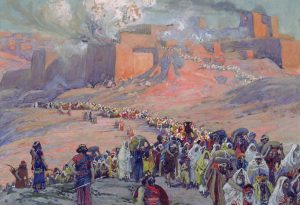
“Flight of the Prisoners” by Tissot (Photo credit: Public domain/thejewishmuseum.org)
I recall that the prophet Isaiah prophesied to king Hezekiah about the captivity that was coming. “Hear the word of the LORD of hosts: ‘Behold the days are coming when all that is in your house, and what your fathers have accumulated until this day, shall be carried to Babylon; nothing shall be left,’ says the LORD. ‘And they shall take away some of your sons who will descend from you, whom you will beget; and they shall be eunuchs in the palace of the king of Babylon’” (Isa. 39:5–7).
W.A. Criswell says, “Daniel is a victim of this judgment of God upon the sins of the people. He was of princely extraction, the seed royal. Born to rule, he was bred in the expectation of a scepter. He never dreamed of slavery to a heathen monarch in a foreign land. Yet, in the life of this youth the prophecy of Isaiah and the judgment of God, sadly and tragically, came to pass. He was made a eunuch in the court of the king of Babylon. He was a dry tree. He was an emasculated man with no hope of family or issue or posterity.”
What a disaster! Their lives were destroyed. Their bright hopes for the future were crushed. They were taken from their families and wouldn’t have families of their own in the future. How would you react? With depression, anger, bitterness? The Bible doesn’t tell us the process Daniel and his friends went through; nor does it tell us how they overcame. But, clearly they did overcome and became shining lights for God in the Babylonian society. The book of Daniel is full of wonderful accounts of faith in action during difficult times. Consider the deliverance from the fiery furnace, the lion’s den and the decree to kill all wise men. These young men drew deeply from the faith of their fathers, which enabled them to live as righteous men, even though they had certainly been deeply scarred by their experiences.
These four young men had names with spiritual meanings. Daniel: God is judge; Hananiah: the LORD is gracious; Mishael: who is He that is God? and Azariah: the LORD helps.

Photo credit: Mila Ranta/wikipedia.org
John Walvoord said, “Significantly, all of their Hebrew names indicate their relationship to the God of Israel and in the customs of the time connote devout parents. This perhaps explains why these, in contrast to the other young men, are found true to God: they had godly homes in their earlier years. Even in the days of Israel’s apostasy, there were those who corresponded to Elijah’s seven thousand in Israel who did not bow the knee to Baal.”
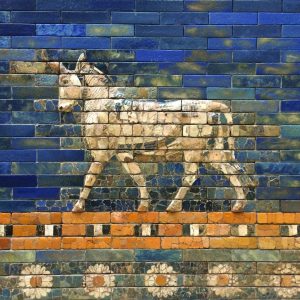
Jamie430/wikipedia.org
Daniel was probably born at the time of King Josiah, one of the most righteous kings of Judah. Criswell refers to it as a time of revival in Judah. Daniel may have observed the public reading of God’s Word during this time (2 Kings 23:2). Undoubtedly, he and his contemporaries and their families would have been profoundly influenced by this spiritual revival. The spiritual impact of Daniel’s childhood and youth equipped him for a life of serving God in difficult times.
In the last part of the book of Isaiah, the prophet wrote messages of hope for those returning from captivity. In chapter 56, Isaiah spoke about eunuchs having a place in God’s plan. This is a clear indication that some of the sons of Judah had been made into eunuchs during their time in Babylon. “…nor let the eunuch say, ‘Here I am, a dry tree,’ for thus says the LORD: ‘To the eunuchs who keep My Sabbaths, and choose what pleases Me, and hold fast My covenant, even to them I will give in My house and within My walls a place and a name better than that of sons and daughters; I will give them an everlasting name that shall not be cut off’” (Isa. 56:3–5).
God is able to take incomplete, scarred and damaged people and enable them to overcome and live in a way that glorifies Him and blesses those around them. None of us has perfect circumstances in our lives but we can find solace, comfort and healing at the hands of a perfect God. Parents, be encouraged, the seeds of righteousness that you plant in your young children will reap a harvest. Daniel and his companions were snatched away from their godly homes and suffered greatly, but the desire to follow God’s ways went with them into a foreign land.

Babylon (Photo credit: Public domain/wikipedia.org)
Daniel could have responded to the terrible things that had happened to him by falling into deep depression. He could have lashed out in anger. He could have spent his time bitterly lamenting his fate. He could have turned away from God. Instead we read, “Daniel purposed in his heart” (Dan. 1:8). That means he made a decision. What follows may seem minor. It only had to do with what food he would eat, but I believe it was pivotal. Daniel had decided to live, and to live for God. Without this decision, he might not have ever written a prophecy, become a man of prayer or been able to influence kings.
I speak from experience. After a few years of marriage, my husband and I were told that we would never have children. We had a choice to make and we chose to live our lives for the Lord and to trust in His perfect plan for us. I remember a pivotal day when I prayed and told the Lord that I knew He could heal, but I submitted to His plan for our lives. If it included children—wonderful, but if not, I wanted His perfect plan for our lives.
Daniel was committed to following God’s ways even when it came to food. “Daniel purposed in his heart that he would not defile himself with the portion of the king’s delicacies, nor with the wine which he drank” (Dan. 1:8). The Torah (Gen.–Deut.) had set out specific ways that the children of Israel were to eat. Daniel was clearly committed to eating kosher! It is clear that it was risky to reject food from the king’s table. The chief of the eunuchs was even fearful for his own life—“Then you would endanger my head before the king” (v. 10). Daniel was so committed that, in spite of this negative response, he asked the steward who was appointed over them to allow them to give it a try. After ten days, their appearance was even better than those who had been eating the delicacies of the king! By eating only vegetables and drinking only water, Daniel avoided all non-kosher foods. Many orthodox Jewish people today do similarly when they travel and normal kosher food is not available.
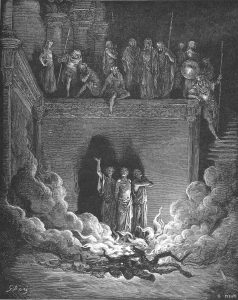
“Shadrach, Meshach and Abednego in the Fiery Furnace” by Gustav Dore (Public domain/wikipedia.org)
Later we find a similar commitment to righteousness when the issue of idol worship arises (Daniel 3). The three friends of Daniel refused to bow to the statue even though the consequence of disobedience was death. They didn’t know in advance that God would rescue them! But their resolve was not shaken by the fear of a gruesome death. They told the king, “Our God whom we serve is able to deliver us from the burning fiery furnace, and He will deliver us from your hand, O king. But if not, let it be known to you, O king, that we do not serve your gods, nor will we worship the gold image which you have set up” (Dan. 3:17–18). God rewarded their faith and their lives were saved out of the furnace.
God used Daniel on more than one occasion to bring revelation to the king. He interpreted dreams and visions. We do not find Daniel to be proud or self-aggrandizing even though that would be a natural tendency. He doesn’t take credit personally but always glorifies God. “Daniel answered in the presence of the king, and said… ‘But there is a God in heaven who reveals secrets, and He has made known to King Nebuchadnezzar what will be in the latter days…’” (Dan. 2:27–28).
Daniel always spoke the truth to the kings, and by doing so he exhibited incredible spiritual courage. In true prophetic fashion, he told King Nebuchadnezzar that God was going to humble him, that he would eat grass like the beasts of the field for seven years. On another occasion he was asked to interpret the handwriting that appeared on the wall to King Belshazzar. The king attempted to motivate Daniel through flattery, and then through promise of material benefits and fame, “And I have heard of you, that you can give interpretations and explain enigmas. Now if you can read the writing and make known to me its interpretation, you shall be clothed with purple and have a chain of gold around your neck, and shall be the third ruler in the kingdom (Dan. 5:16). Daniel proved that he was a man of integrity and refused the bribes. “Let your gifts be for yourself, and give your rewards to another” (Dan. 5:17). He then showed himself to be unafraid to give the message which was one of doom for King Belshazzar and his kingdom.
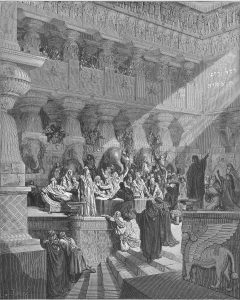
“Daniel Interprets the Writing on the Wall” by Gusav Dore (Photo credit: Public domain/wikipedia.org)
Daniel’s character was recognized. King Belshazzar’s mother gave him an amazing tribute, “There is a man in your kingdom in whom is the Spirit of the Holy God. And in the days of your father, light and understanding and wisdom, like the wisdom of the gods, were found in him…inasmuch as an excellent spirit, knowledge, understanding, interpreting dreams, solving riddles, and explaining enigmas were found in this Daniel…” (Dan. 5:11–12).
Even those who jealously plotted against him could find no flaw. “So the governors and the satraps sought to find some charge against Daniel concerning the kingdom; but they could find no charge or fault, because he was faithful; nor was there any error or fault found in him” (Dan. 6:4).
Daniel and his friends exhibited a purity of character and a commitment to following God in righteousness. Their deep connection to God enabled them to stand up for what is right with incredible courage. They made a decision to follow God and His ways, regardless of the danger involved.
Daniel was a man who communed with God in a deep and spiritual manner. It seems that his first thought in any situation was to pray. The deep truths that God entrusted to Daniel could not have been given to a man who wasn’t fully committed to God.
King Nebuchadnezzar precipitated the first crisis. He demanded that his cadre of wise men (astrologers, magicians, sorcerers and Chaldeans) tell him the content of a troubling dream and its interpretation. When they were unable to do so, he commanded the death of all wise men. Daniel heard of the crisis and realized that the death penalty would include him and his companions. He asked the king for time and then took the matter to prayer.
“Then Daniel went to his house and made the decision known to Hananiah, Mishael and Azariah, his companions, that they might seek mercies from the God of heaven concerning this secret so that Daniel and his companions might not perish with the rest of the wise men of Babylon” (Dan. 2:17–18). After united prayer, God revealed the interpretation to Daniel in a night vision. What was Daniel’s response? More prayer! In Chapter 2, verses 20–23, we find a beautiful prayer of thanksgiving to God for giving His wisdom to Daniel.
Another time a plot was devised to trap Daniel. King Darius of the Medes was encouraged by some of his governors and satraps to decree a 30-day moratorium on any prayer or petitions to any god or man other than the king. Those guilty would be thrown into a den of lions. How did Daniel respond? “Now when Daniel knew that the writing was signed, he went home. And in his upper room, with his windows open toward Jerusalem, he knelt down on his knees three times that day, and prayed and gave thanks before his God, as was his custom since early days” (Dan. 6:10).
Notice, Daniel prayed three times a day. This is a Jewish custom that continues to the present day. Devout Jews pray in the morning, in the afternoon and in the evening. These are known as the sharcharit (morning), mincha (afternoon) and maariv (evening) prayer times. According to the Artscroll commentary on Daniel, “The practice of praying three times a day, though not a Torah obligation had already been instituted in Daniel’s time. Otherwise it is inconceivable that Daniel would have endangered himself for the purpose of prayer…the institution of praying three times a day has its roots in ancient times.” Later, the prayers were formalized in the time of Ezra. According to www.chabad.org, “they formalized the 18 blessings of the amidah which is the heart of the daily prayer service. At that time, they determined that this formula of standard prayer be said thrice daily, corresponding to the Temple sacrifices.”
Daniel prayed three times a day and had been doing so since he was young. The threat of death was not going to stop him from communing with God. It was a trap, but God delivered him out of the trap. Yes, he was thrown into a den of hungry lions. But, God stopped the lions from attacking Daniel.
One day Daniel was reading the scroll of Jeremiah and realized that there was a limit to the duration of their captivity—70 years. I am pretty sure that I would have thrown a party and invited all my fellow captives to come over and rejoice! But, Daniel responds differently. He responds with prayer. “Then I set my face toward the Lord God to make request by prayer and supplications, with fasting, sackcloth and ashes. And I prayed to the LORD my God, and made confession, and said…” (Dan. 9:3). The following verses (vv. 4–19) include one of the most moving prayers of repentance in the Bible.
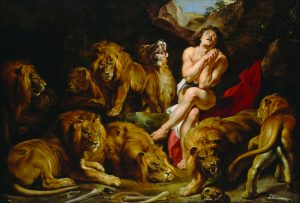
“Daniel in the Lion’s Den” by Rubens (Photo credit: Public domain/wikipedia.org)
Daniel’s prayer begins with an acknowledgement of the greatness of God—a God of mercy who keeps His covenants. It then acknowledges that God works in cooperation with man. He keeps His promises for those who love Him and who keep His commandments. This thought is echoed by Yeshua (Jesus), “If you love Me, keep My commandments” (John 14:15). The Apostle John said, “For this is the love of God, that we keep His commandments. And His commandments are not burdensome. For whatever is born of God overcomes the world” (1 John 5:3–4).
Daniel next devotes several verses to confession of sin and repentance on behalf of his nation. He confesses rebellion, sin, iniquity and wickedness. He laments that the people of God have departed from His precepts and judgments. He confesses that they did not listen to the prophets. He repents of lawlessness. He prays with utter humility using the phrase “shame of face” twice to describe the people of Israel. In the Artscroll commentary on Daniel, this is explained, “Our shame is not because we have, as part of our punishment, lost our glory. Rather, we now feel deeply ashamed merely because we dared to sin against You (Alshich; Malbim).”
Daniel acknowledges the righteousness of God repeatedly during the prayer, even under the punishment of exile. He cites the prophecy of Moses, “As it is written in the Law of Moses, all this disaster has come upon us” (Dan. 9:13).
Finally Daniel comes to his petition, that God restore Jerusalem, the holy Temple and His people, “O Lord hear! O Lord, forgive! O Lord, listen and act! Do not delay for your own sake, my God, for Your city and Your people are called by Your name” (Dan. 9:19).
Maybe you have experienced a crushing life blow. The pain may be overwhelming. You don’t have to stay in that place of depression and pain. God has a plan and a purpose for your life. I encourage you to go to Him in prayer and recommit your life to Him; submit to His ongoing plan for your life. Then purpose in your heart—make a decision to live, and to live purposefully, with righteous action, in constant communion with God. You will be amazed at what He will unfold before you.
Criswell, W.A. Expository Sermons on the Book of Daniel. Grand Rapids: Zondervan Publishing House, 1968.
Scherman, Rabbi Nosson, Goldwurm, Rabbi Hersh, and Zlotowitz, Meir (Ed.). Daniel, Artscroll Tanach Series. Brooklyn: Mesorah Publications, Ltd., 1979.
Walvoord, John. Daniel, The Key to Prophetic Revelation. Chicago: Moody Press, 1971.
Wood, Leon. A Commentary on Daniel. Grand Rapids: Zondervan Publishing House, 1973. www.chabad.org
All logos and trademarks in this site are property of their respective owner. All other materials are property of Bridges for Peace. Copyright © 2024.
Website Site Design by J-Town Internet Services Ltd. - Based in Jerusalem and Serving the World.